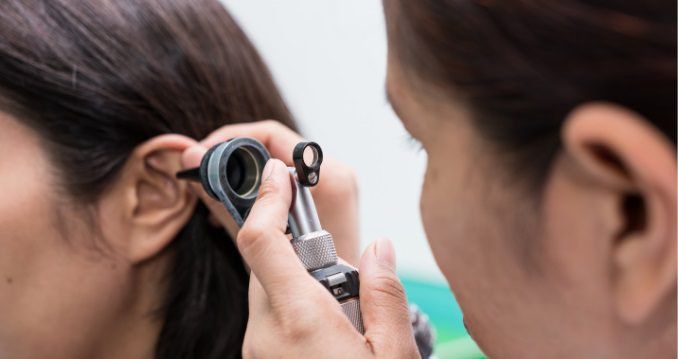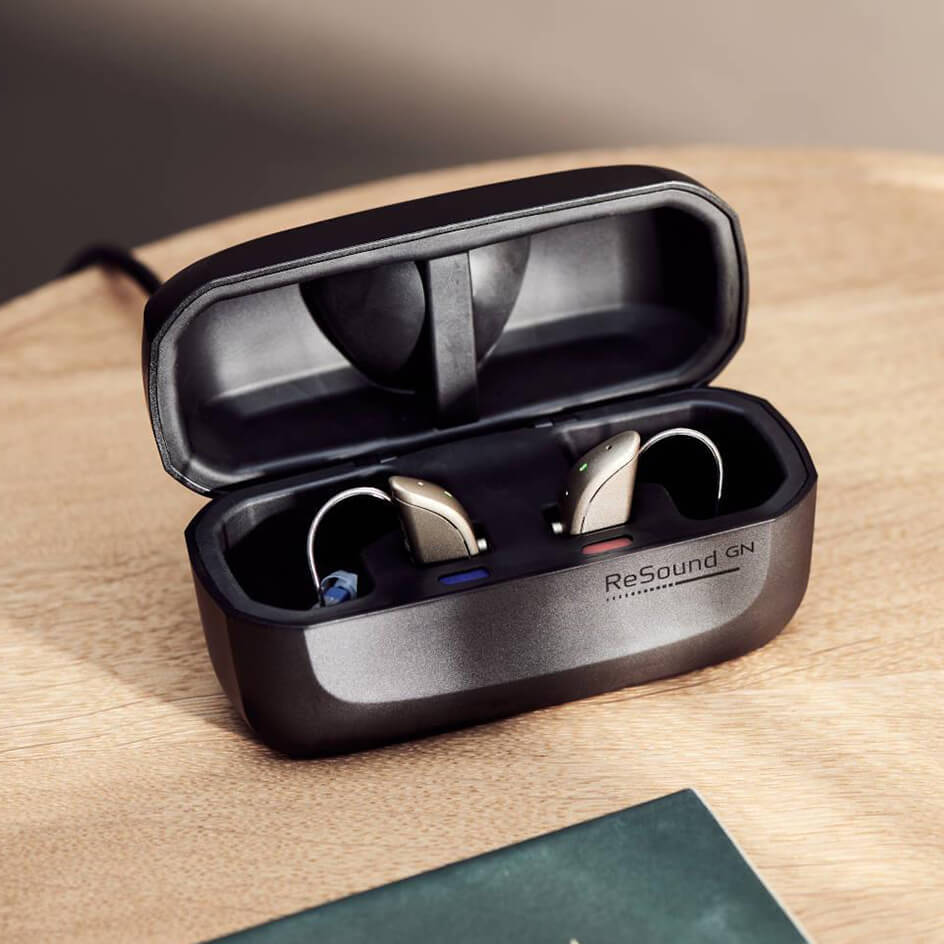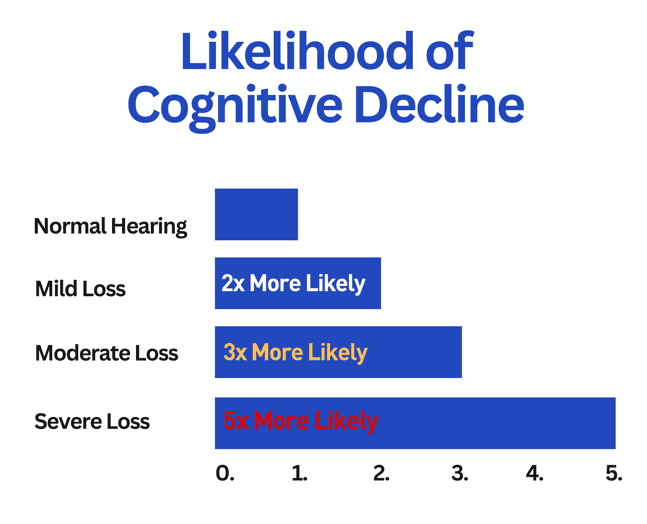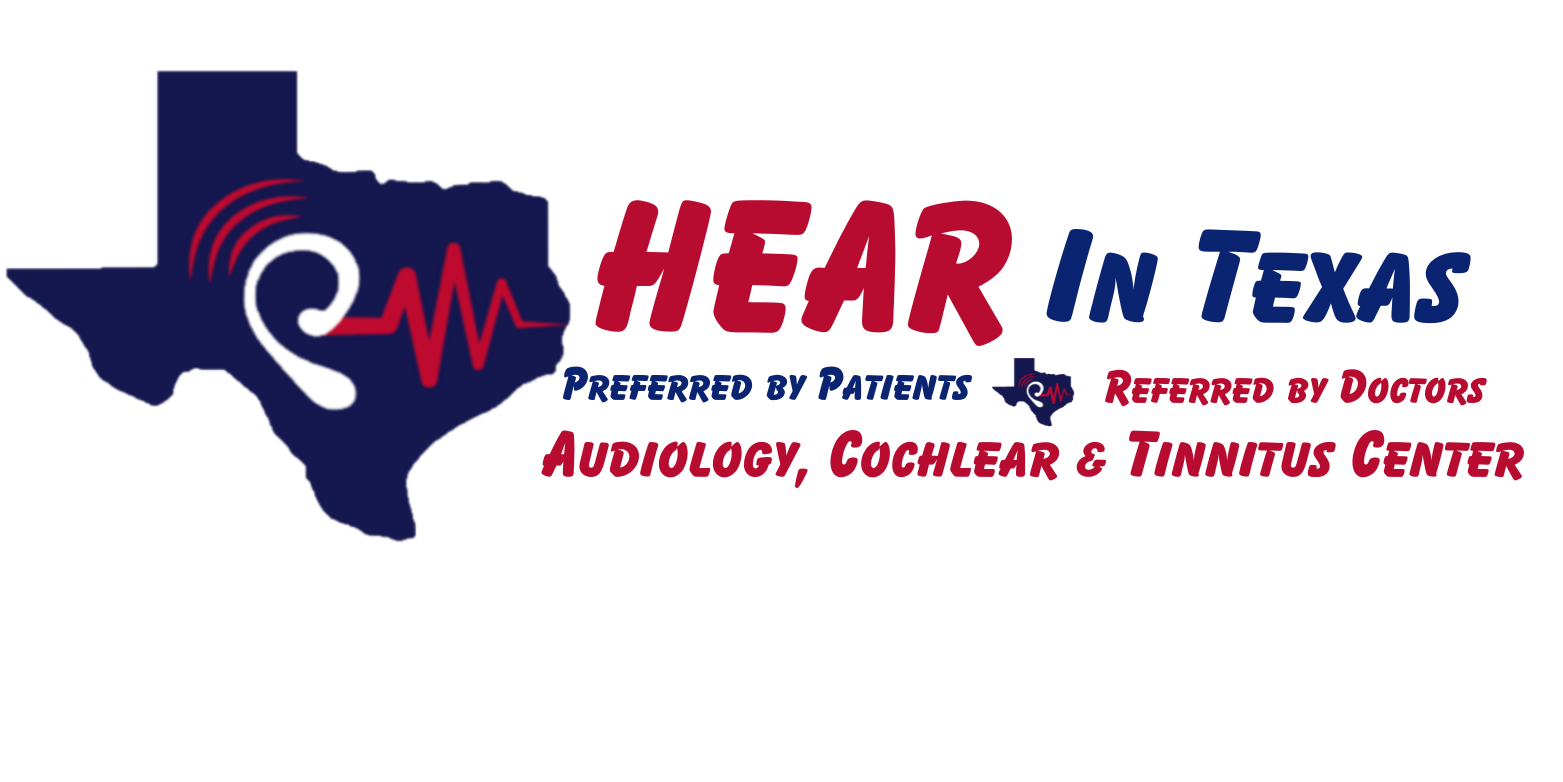HEAR IN TEXAS
Cognitive Screening
Cognitive Testing Allows For The Early Detection Of Decreased Cognitive Function

A decade-long study conducted by Dr. Frank Lin showed a five-fold increase in dementia for individuals with mild, medium, or severe hearing loss.
How the loss of sensory stimulation, compensation by your brain’s central processing system, and social isolation associated with hearing deterioration increase your risk for developing dementia is complex, but the link between the two conditions gives audiologists plenty of reasons for concern.
For Dr. Sally, that concern has led her to invest in cognitive screening using Cognivue testing in order to help hundreds of patients and their families live a richer, more independent lifestyle by combining our expertise with top-level technology for the early detection of cognitive decline.

The Link Between Hearing Loss And Cognitive Decline.
There are several theories about why hearing loss and cognitive decline go hand-in-hand. Four classifications established by the American Academy of Neurology identify the different reasons why hearing loss can lead to dementia.
01. Common Risk Factors
The largest common risk factors are age combined with high blood pressure, heart disease, and/or diabetes, which often accompany hearing loss. The narrowing of blood vessels, which impacts the network of small blood vessels feeding the cochlea, is common with these conditions.
02. Mental Overload
When hearing loss is left untreated, the central auditory pathways become overloaded with the increasingly difficult task of conducting, analyzing, and processing sound signals. Other parts of the brain, like those involved in thinking and memory, pitch in order to compensate, redirecting resources used for those purposes to help with hearing rather than cognitive functions.
03. Structural Changes
As sound stimulation from hearing loss declines, areas of the brain used for sound processing begin to atrophy or shrink.
04. Social Isolation
Many people experiencing hearing loss begin to avoid social events or avoid social gatherings due to the stress and discomfort of struggling to keep up with conversations in noisy settings. University of British Columbia researchers report that for every 10-decibel drop in hearing, there is a subsequent increase in social isolation by 52%.
What Is Cognitive Screening, And Why Is It Important?
A University of Bordeaux study published in 2018 identified a significant connection between self-reported hearing loss and dementia. The study showed that the cases of disabilities, dementia, and depression among elderly men with elevated hearing loss continued to increase, but those using hearing aids or with no diagnosed hearing impairment saw little to no cognitive decline.
This study supports our concern that a failure to address hearing has a significant impact on cognitive decline and puts our patients at risk for early-onset dementia. Hear in Texas includes cognitive testing using ClarityTM by Cognivue as one of our services in order to help our patients identify and manage cognitive decline as well as for developing the right hearing care plan and hearing aid selection.
How Does Cognitive Screening Work?

Cognivue provides a personalized, consistent, and reliable assessment of your overall brain health. The test establishes a baseline score against which you and your doctor can monitor and detect cognitive changes as they develop.
Features of Cognivue include:
• Quick assessment (about 10 minutes)
• Non-invasive
• Interactive and intuitive
• Self-administered
• Immediate results after testing
• Easy to understand results
• Secure and confidential
These FDA approved tests eliminate testing variability and inaccuracy through a unique software algorithm designed to use patient responses in order to adapt the test to the patient’s performance.
What Cognitive Screening Results Show
Cognitive testing results provide an outline for you and your doctor to evaluate the various conditions that contribute to cognitive decline, such as hearing loss, enabling you to establish a plan of action to limit continuing decline. Results from testing are separated into three different categories:
• Scores over 75 show normal cognitive function.
• Scores between 51 and 74 reveal some or low cognitive impairment requiring some minor interventions.
• Scores 50 and below indicate significant cognitive impairment for which you need to take urgent action to prevent further damage.
Helping You to Choose the Right Hearing Technology through our Partnerships with all Manufacturers
With each level of hearing loss and person that we help having their own unique set of circumstances, there is never a “one size fits all” approach.
That’s why we partner with every hearing aid manufacturer to ensure that we can always find the right solution for your unique needs.
This also means that we’re often front of the queue to get our hands on the latest hearing technology to ensure that you always have access to the latest developments.

Schedule A Cognitive Screening At Hear in Texas
Many of the patients we see in our clinic have put off addressing their hearing loss for some time, which could mean that they are beginning to experience some degree of cognitive decline by the time we conduct our hearing assessment.
As a part of our commitment to our patients and the New Braunfels community, Hear in Texas offers cognitive screening in order to identify and head off cognitive decline and dementia.
If you, or a loved one, is struggling with recall, making decisions, organizing tasks, losing your sense of direction or other issues related to cognitive decline, especially if you’re also experiencing hearing loss, contact us to schedule cognitive screening by submitting the adjacent form.
The Connection between Cognitive Decline and Hearing Loss | New Study
At Hear in Texas, we are committed to providing our patients with the latest information and research on hearing loss and cognitive decline.That’s why we were excited to hear about a recent study conducted by JAMA Neurology that aimed to determine the impact of hearing aids and cochlear implants on cognitive decline in individuals with a hearing loss.
The study, which included 31 studies with 137,484 participants from various regions, found that the use of hearing aids was associated with a 19% reduction in long-term cognitive decline. Additionally, even patients who already had mild cognitive impairment (“early dementia”) benefitted from the use of hearing aids, as they also had approximately a 20% lower risk of progressing to dementia.
These findings suggest that it is never too late to start using hearing aids, but early treatment may help to preserve the most cognition.
At Hear in Texas, we understand the importance of cognitive function and how it relates to hearing loss. That’s why we offer not only traditional hearing tests but also cognitive assessments such as Cognivue.
This quick and easy test can be taken in our office or at home and assesses cognitive function in areas such as memory, attention, and processing speed, providing a more comprehensive understanding of an individual’s cognitive abilities.
If you are concerned about cognitive decline and want to schedule a Cognivue assessment, please reach out to Hear in Texas today. Our dedicated team of hearing professionals will be happy to assist you in finding the right solutions to improve your hearing and cognitive function.
Don’t let hearing loss impact your overall health and well-being. Schedule an appointment with Hear in Texas today.

Hearing Health Resources
Latest News

How Hear in Texas Supports Veterans With Hearing Loss
Honoring Veterans With Accessible Hearing Care
At Hear in Texas, we hold a deep appreciation for the sacrifices that veterans have made for our country. As a veteran-owned business, we are committed to serving those who have served us by providing accessible, personalized hearing care.
Our commitment extends beyond mere acknowledgment—we aim to be a cornerstone of support for veterans in managing and overcoming the challenges of hearing loss.
Partnered With the VA: What That Means
Our partnership with the Department of Veterans Affairs (VA) positions us as a VA-authorized community care provider. This collaboration allows us to deliver specialized auditory care that’s finely tuned to the lifestyle and healthcare needs of veterans across Texas.
Every veteran deserves a service provider who understands their experiences and lifestyle nuances, which is why our services are not just about treating hearing issues, but about holistic health improvement.
Eligibility and Referral Process
Navigating healthcare can sometimes be daunting, soour referral processhas been crafted to be as seamless as possible for our veterans.
Request an Audiology Referral to a CCN Provider
Begin by requesting a referral within the VA system for audiology care.
Contact your primary care provider, VA healthcare team, or the Community Care Network, or visit MyHealth.VA.gov to request a referral online.
Hear in Texas Is Your Authorized CCN Provider
As a credited member of the Community Care Network (CCN), we’re poised to offer care once your referral is approved.
CCN Provider: Dr. Celia Miranda (“Dr. Sally”)
NPI #: 1639391451
Location: 2967 Oak Run Pkwy Suite #315, New Braunfels, TX 78132
Schedule Your Appointment With Hear in Texas
With your referral number ready (usually provided in two to three days), call Hear in Texas to arrange your appointment.
You can also opt for the VA healthcare team to schedule this for you at (210) 949-9702.
Receive Your Authorization Letter
After your appointment is confirmed, you’ll receive an authorization letter. This document includes critical details such as the authorization number, information about your approved in-network community provider, and a description of the approved care.
Attend Your Appointment
It’s important to bring your authorization letter, alongside any relevant medical records, to your appointment at Hear in Texas.
What Services Are Offered to Veterans?
Our dedicated services cover a spectrum of hearing health needs to address issues unique to veterans.
Positional Vertigo Management: Understand and manage balance disorders.
Tinnitus Management: Alleviate ringing or noise perception in the ears with our tailored management plans.
Hearing AidsandDevice Repairs: We offer a full suite of hearing aids and assistive devices, backed by repair and maintenance services.
Earwax Removal: Professional care in the removal of cerumen, ensuring auditory health and comfort.
NEXUS Letters: Specialized documentation supporting disability claims related to hearing loss.
Hearing Assessments: Comprehensive testing to track and diagnose hearing capabilities.
Cochlear Implants: When hearing aids aren’t enough, the latest implants can provide significant improvement.
Cognitive Screening: Evaluate cognitive functions affected by hearing loss for an integrated health approach.
Benefits of Choosing Hear in Texas
As a veteran and family-owned clinic,our team of expertsis deeply rooted in the values of integrity, trust, and community spirit.
Ultramodern technology combined with partnerships with leading hearing aid manufacturers guarantees the highest quality care tailored to your needs.
Your unique requirements are put first in every interaction, and you can rest assured we’re committed to supporting your hearing health journey withcomprehensive, long-term solutions.
How to Get Started
Get in touch with our team today and enhance your connection with the world around you!
Request a callbackto talk to our team about any questions or concerns or call us directly at(830) 360-2000.
© Copyright 2025 Hear in Texas. All Rights Reserved. Designed by Topline




